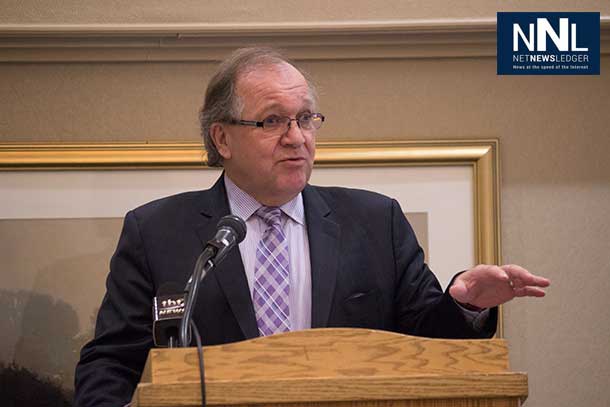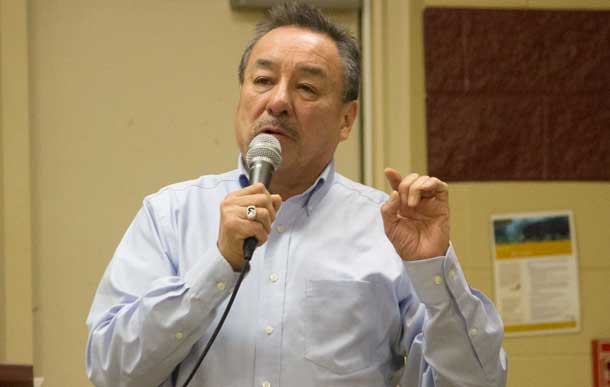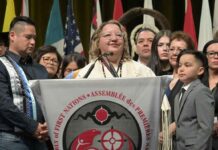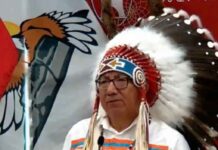
OTTAWA – First Nations leaders are angry over comments that the federal Minister for Aboriginal Affairs made in the House of Commons. The Minister stated that the Confederacy of Nations Chiefs were “rogue chiefs who are threatening the security of Canadians, their families, and taxpayers”.
What is the Confederacy of Nations?
“This historic meeting of the Confederacy of Nations sees our leaders from across the country come together in unity to discuss the federal education bill, and as anticipated it was unanimously rejected,” said Chief Isadore Day of Serpent River First Nation who moved the motion to initiate the Confederacy. “This historical meeting of our leaders is necessary and aims at unifying on a single cause and are providing direction on the future of the education of our children and the future of our nations.”
The move was first brought after the resignation of Chief Shawn Atleo as National Chief.
The call for a Confederacy of Nations was made by Ontario Regional Chief Beardy. The Regional Chief stated, “As you are aware, Bill C-33, the Harper government’s proposed First Nations Control of First Nations Education Act went up for its first debate on second reading in the House of Commons on April 30 despite it not going for national debate of First Nations by the chiefs in this country. I am requesting that the AFN executive immediately call for a Confederacy of Nations meeting.”

“We have invoked AFN Charter provisions that give the First Nations across this country a say about matters of great importance. Up to this point, the Minister of Aboriginal Affairs and the National Chief’s office have unilaterally pushed Bill C-33. Where the executive has not been able to stand prudent on behalf of First Nations, the Confederacy reps will assert and stand firm,” said Chief Day.
Here is the exchange from Question Period in the House of Commons on Thursday, May 15 2014:
Ms. Jean Crowder (Nanaimo—Cowichan, NDP):Mr. Speaker, today, for the first time since 2004, the Confederacy of Nations is meeting. Fifty first nations delegates from all over over Canada will discuss their concerns about the education act, Bill C-33. They want to sit down with the Minister of Aboriginal Affairs and Northern Development and discuss fair and equitable funding for first nations’ education.
Will the minister agree to meet with the Confederacy of Nations?
Hon. Bernard Valcourt (Minister of Aboriginal Affairs and Northern Development, CPC): Mr. Speaker, I think members of the House will agree that we should have members condemn, in the strongest terms, the threats of those rogue chiefs who are threatening the security of Canadians, their families, and taxpayers.
I will meet with these people when they unequivocally withdraw their threats to the security of Canadian families, taxpayers, and citizens.
Ms. Jean Crowder (Nanaimo—Cowichan, NDP): Mr. Speaker, we are talking about first nations chiefs from coast to coast to coast who have legitimate concerns about education. If they thought their concerns were being addressed, they would not be requesting this meeting with the minister.
Bill C-33 was supposed to provide first nations’ control over education. Instead, it will only serve to extend the reach of the minister.
The Confederacy of Nations wants to talk about real first nations’ control of education, where first nations have the necessary resources to provide a modern education for their children. Will the minister meet with these chiefs?
Hon. Bernard Valcourt (Minister of Aboriginal Affairs and Northern Development, CPC): Mr. Speaker, again, contrary to the New Democratic Party, I do not believe that these chiefs represent the majority of the chiefs and councils throughout Canada, who I know and have met many times, who care about reconciliation and who care about their children and their education. I do not think this group is representative of the majority of first nations, and I trust that the good, hard-working chiefs will speak up.





